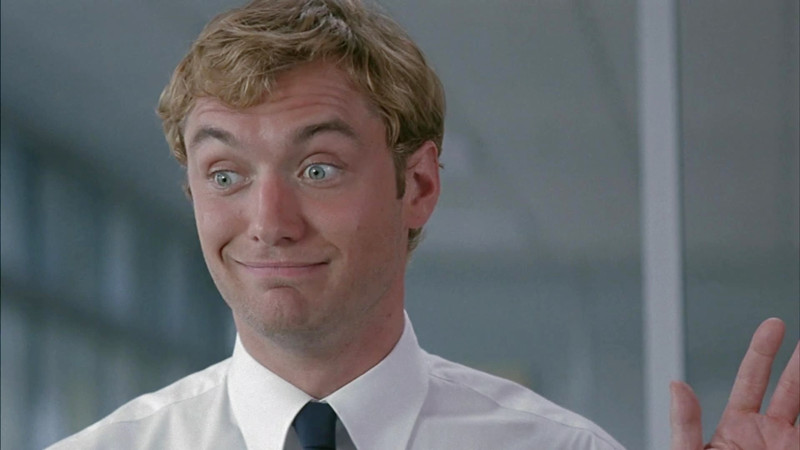
The 2000s were without a doubt an explosive halcyon for comedies, with Will Ferell reigning as the heavyweight champion. Every year of the decade was jam-packed with iconic classics from the Frat Pack, the Apatow Mafia, the Farrelly Brothers, Mike Myers, Todd Philips and Adam McKay, to name a few. That said, many other seminal comedies from this decade have swept under the radar, been unfairly criticised or remain beloved by a cult following.
1. Bubba Ho-Tep (Don Coscarelli, 2002)
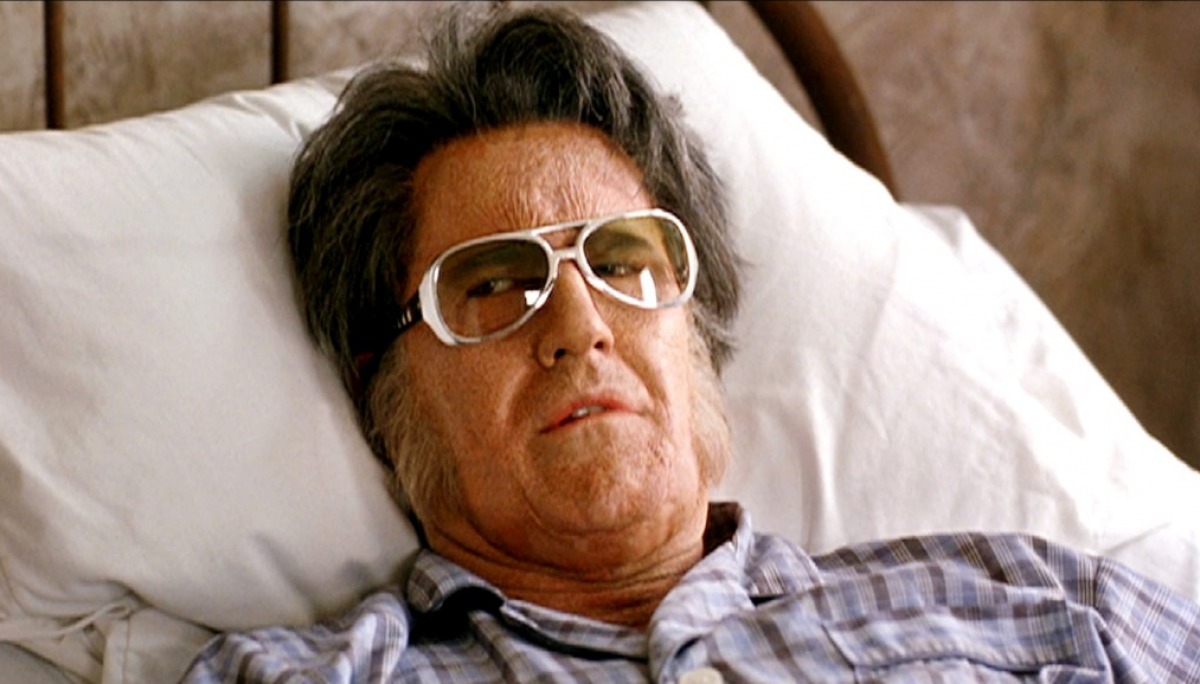
An invalid claiming to be Elvis Presley (Bruce Campbell) and an African American man who believes he’s JFK (Ossie Davis) must save their nursing home from a reanimated ancient Egyptian mummy they call ‘Bubba Ho-tep’ (Bob Ivy). This alternate history monster-comedy’s based on the novella by Joe R. Lansdale.
In what Roger Ebert described as “delightful wackiness,” Bubba Ho-Tep excels in drama, horror and comedy equally, creating a unique fantasy mythology unto itself. The Evil Dead’s Bruce Campbell is as flawlessly believable as Elvis as Austin Butler is in the most-recent biopic. It’s clearly a part Campbell was born to inhabit. However, the late Ossie Davis boasts the film’s funniest lines, in his stalwart assertion he’s definitely JFK. The irony of the movie’s premise and the elderly people’s parody-action sequences are balanced with an ominous tone, moody lighting and terrifyingly-realistic Egyptian mummy.
For all its silliness and pop culture pastiche, Bubba Ho-Tep is a tear-jerking drama about ageing and coming to terms with one’s own mortality. Moreover, it addresses the neglect and disrespect society has for the elderly. It calls for reform in both the healthcare system and a reassessment of our own prejudices towards and treatment of older people. The unusual, rare gem that is Bubba Ho-Tep is a dream for those whom enjoy horror-comedies, as well as rewarding those in-search of something with substance and message.
2. The Triplets of Belleville (Sylvain Chomet, 2003)
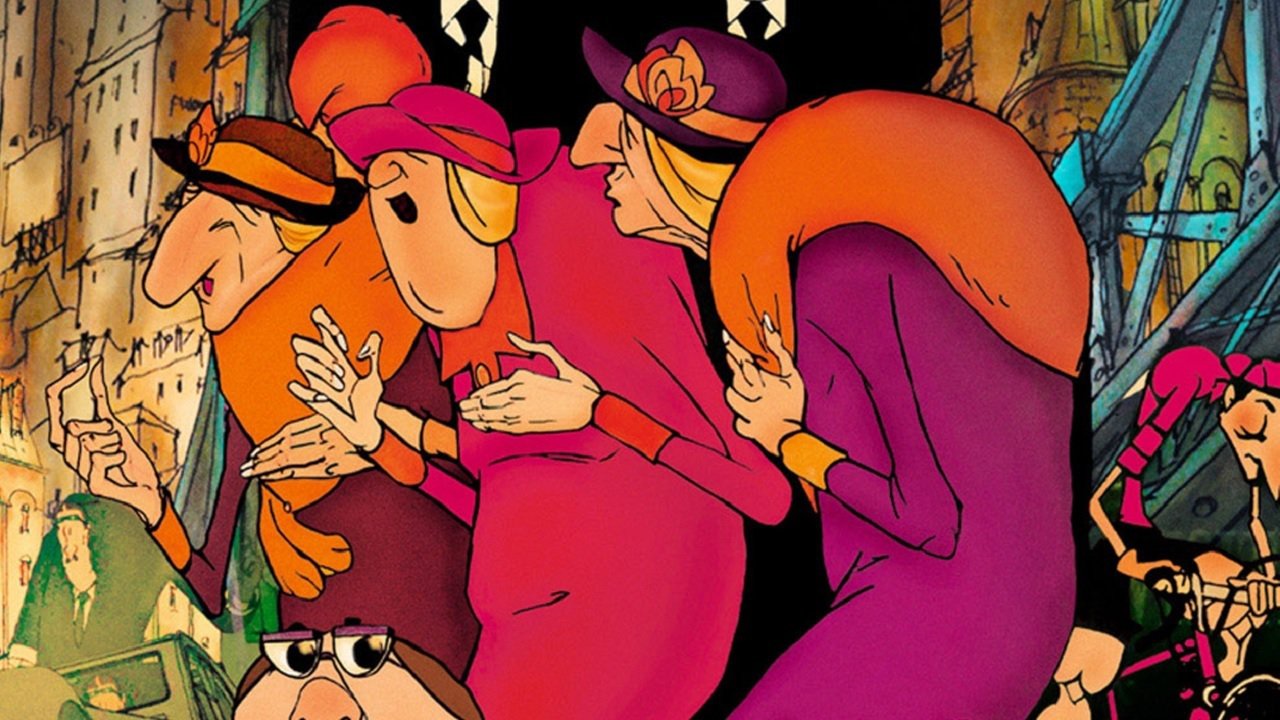
In this French animated epic noir, Madame Souza must rescue her cyclist grandson, Champion, after he’s kidnapped by French mobsters and transported overseas. Madame Souza’s aided by a family of eccentric triplets who used to be famous singers.
Although a deeply disturbing movie, The Triplets of Belleville resurrects the form of silent, physical and behavioural humour from the days of Buster Keaton, for bizarrely hilarious results. Its magical-realist caricatures and settings are jaw-dropping in their mammoth scope, inventiveness and detail. The story’s a classic mystery-action-adventure, executed with optimal suspense.
With essentially no dialogue, much of its humour is located in the accentuated characters and their movements. A man who looks like Django Reinhardt plucks a guitar with his toes. The triplets use a vacuum cleaner and a fridge as musical instruments. A grinning waiter has his back literally ‘bent over backwards,’ with his nose in the air. This marvellously strange film is a must-watch off-beat comedy, providing audiences with French animation at its most engrossing and ingeniously crafted.
3. Wake Up, Ron Burgundy: The Lost Movie (Adam McKay, 2004)
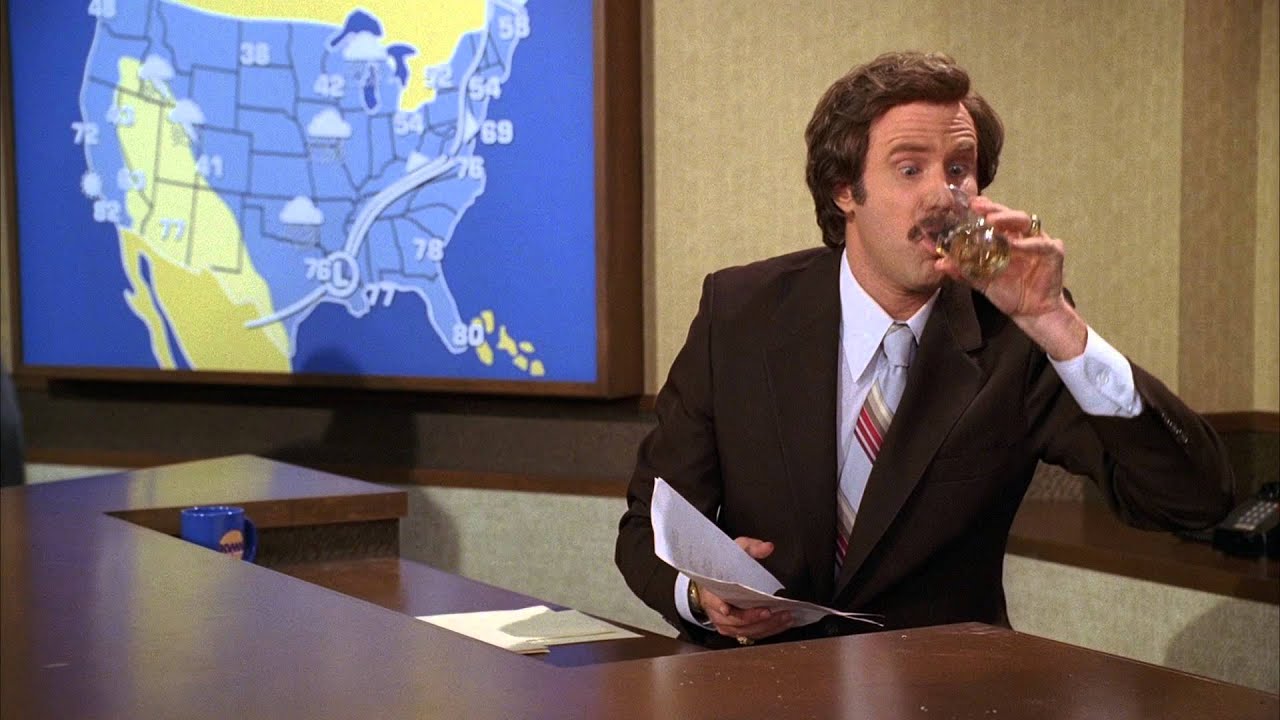
Complied from Anchorman outtakes, the story of the similarly-plotted Wake Up, Ron Burgundy runs in-parallel to the original film. It concerns Ron Burgundy (Will Ferrell), Veronica Corningstone (Christina Applegate) and the news team as they investigate a gang of anarchist bank robbers calling themselves ‘The Alarm Clock.’
For fans of Ferrell and the Frat Pack, this film guarantees more sidesplitting material – gems which didn’t make it into Anchorman. The story’s taken in a more crime-action direction than its parent. Imperatively, the sketches and gags are just as funny, with highlights including Ron staring at Veronica whilst driving for an extended scene, never looking at the road, ignoring her desperation. The high level of comedy remains present in the dialogue: “even a blind man and his pet Japanese devil owl can find true happiness in this world we live in.”
At the same time, the subtext continues to examine the theme of sexism in the workplace, engendered by Applegate’s progressive, confident performance. In addition to the regular gang, there are new characters, such as ‘Jess Moondragon’ (Chad Everett), a scene-stealing cameo from Amy Poehler and SNL legend Maya Rudolph in an early role. Perhaps because the film was released direct-to-video, it’s gone essentially unnoticed. Although not as triumphant and fluid as Anchorman, is stands as an intensely funny caper in its own right.
4. I Heart Huckabees (David O. Russel, 2004)
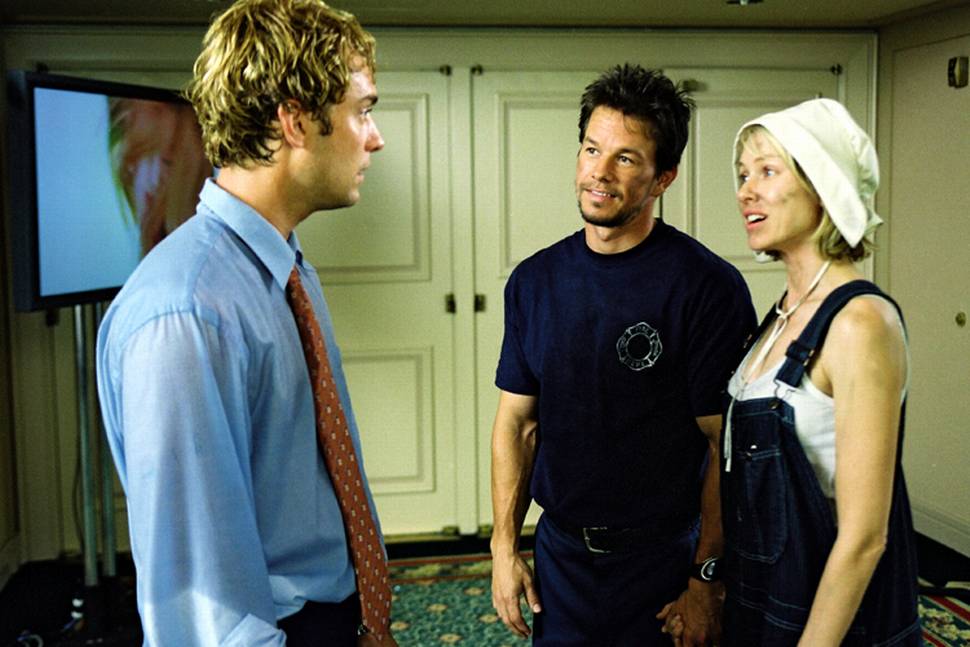
In this philosophical protest film, a pair of “existential detectives” (Dustin Hoffman, Lily Tomlin) are hired to uncover the meanings of their clients’ lives (Jason Schwartzman, Mark Wahlberg, Naomi Watts, Jude Law), whilst being infiltrated by a nihilist (Isabelle Huppert). Meanwhile, Albert (Schwartzman) is on a crusade to save the environment. The film marks the acting debut of Jonah Hill.
Whereas other writers tend to integrate philosophy in the subtext or moral of their story, in I Heart Huckabees, David O. Russel explores existentialism and nihilism on-the-nose. The satirical work by Jude Law and Naomi Watts demonstrates how one’s perception is transformed when one begins to question and analyse the flaws in the establishment. This showcases the liberating yet overwhelming outcome of a mind stripped from the mental bondage of societal indoctrination. Through its dramatisation of existentialist and nihilist philosophies, the film forces audiences to identify the façade of conformity and to think for themselves.
What is more, the screenplay criticises the capitalist prevailing culture of the west, detailing how exponential industrial expansion will result in the destruction of the environment and the ruin of humanity. Schwartzman depicts the struggle of Albert thanklessly attempting to save a hostile world oblivious to global warming. People hate him for upending societal norms, despite his earnest mission to help them, mirroring the contemporary political climate. There exists a larger denotation of how human society must transform, physically, culturally and psychologically, if the human race is to survive. Much of I Heart Huckabees’s comedy is focalised around the absurdity of Albert and Tommy grappling with philosophical concepts, such as when they slam bouncy balls in each-other’s faces.
5. You, Me & Dupree (Anthony & Joe Russo, 2006)
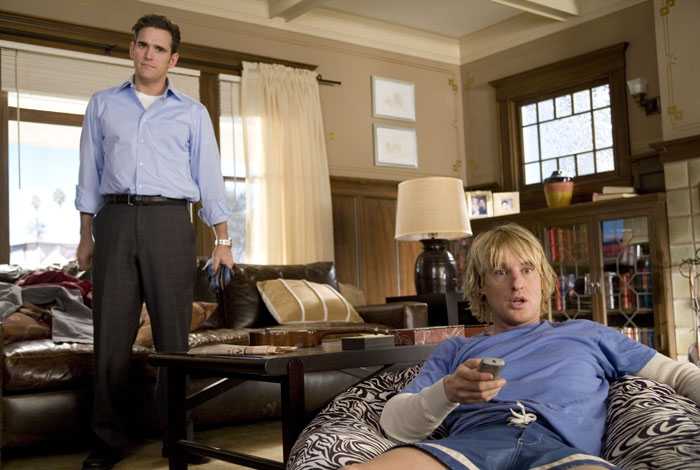
After getting married, Carl (Matt Dillon) and Molly Peterson (Kate Hudson) move into their beautiful new home. Almost immediately, Carl’s best friend, a loveable slacker named Dupree (Owen Wilson), comes to stay for a “few days,” until he can secure a job and a residence. But disaster follows Dupree like a shadow and his calamities turn Carl and Molly’s lives upside-down.
You, Me & Dupree has been misunderstood as a buddy comedy with a heartfelt countercultural message of self-actualisation. Although he’s a hippie with no money, no residence, no job, a proud slacker lifestyle and an apathy to securing work, Dupree’s character arc functions as a beacon of comfort and inspiration to those whom are unemployed or struggling to get ahead in life. His free-wheeling authenticity, kind heart, self-belief and resilience (Owen Wilson based Dupree on “a dog I had as a kid”) compels viewers to accept and love themselves for who they are, in spite of their flaws and the criticisms of others.
Dupree’s philosophy of “-ness”: “it’s your name plus ‘-ness,’” talks of recognising what makes oneself special and unique and celebrating it. His use of this holistic belief serves as an example of positive evolution in himself and he demonstrates tremendous compassion towards others. Overlooking his clumsy and ditzy propensities, there is much to learn from and admire in Dupree. This is attributable to the fun-loving, easygoing mien comedy icon Owen Wilson expertly imbued him with, supported by the proficient foundation in Dillon and Hudson.
Furthermore, the movie was the first feature Bill Hader appeared in and co-stars Seth Rogen and the late Harry Dean Stanton. Aside from its well-executed physical mishap comedy, the script professes a voluminous amount of hilarious dialogue. When his father-in-law, Mr. Thompson, suggests that he should get a vasectomy, Carl asks Dupree: “would you be offended if Thompson asked you to get a vasectomy?”, to which Dupree exclaims: “What? Why would he want me to get a vasectomy, Carl? I barely know the man!”